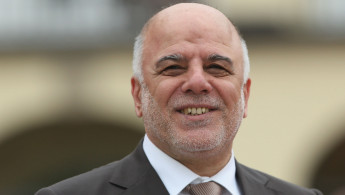Iraq's Abadi proposes clear-out of top government posts
Iraqi Prime Minister Haider al-Abadi called Sunday for sweeping reforms, including abolishing the post of his rival Nuri al-Maliki, in response to weeks of demonstrations against corruption and poor public services.
The measure, announced in an online statement, requires approval from the Council of Ministers and parliament.
Iraq has three vice presidents and three deputy prime ministers.
The move by Abadi comes as the country's first protest movement in years increased pressure for officials to be held accountable for the rampant corruption and abysmal public services.
Top Shia cleric Grand Ayatollah Ali al-Sistani on Friday called for the prime minister to take a tougher stand against corruption and name and shame those impeding reform.
Baghdad and other cities have seen weeks of protests against the poor quality of services, especially power outages that leave Iraqis with only a few hours of government-supplied electricity per day as temperatures top 50 degrees Celsius (120 degrees Fahrenheit).
| Friday after Friday, we'll get the corrupt out. |
Aside from Baghdad, all the demonstrations took place in southern cities like Najaf, Karbala, Hilla, Nasiriyah and Diwaniyah, the power base of many of Iraq's top political parties.
Combined with Sistani's calls for change, that poses a potentially serious challenge for the Shia-led government.
"All of you together to the court, all of you are thieves," chanted protesters in Baghdad's Tahrir Square.
"Friday after Friday, we'll get the corrupt out."
Many demonstrators held Iraqi flags, while some caried a coffin covered in black fabric representing the death of the consciences of parliament and politicians, as well the demise of electricity and other services.
Thousands demonstrated in the southern port city of Basra as well, chanting slogans such as "No, to the parties," and carrying signs including one that read: "It is time for your departure, O you corrupt."
People have protested over services and corruption before, but the demonstrations failed to bring about significant change.
Baghdad's heavy-handed response to the country's most recent protest movement, by Sunni Arabs demonstrating against their marginalisation by authorities helped set the stage for the jihadist takeover of a third of the country last year.
Nabil Jassem, an organiser of the latest protest in Baghdad, said their demands include improving electricity service and finding a new means of combating corruption.
"If anyone thinks this demonstration is against a minister or a certain official, I want to correct this and say it is against everyone who held and dealt with the energy file from 2003 until now," Jassem told AFP.
He urged Abadi to take direct responsibility for energy affairs.
Abadi took office nearly a year ago promising tough action against corrupt practices that had come to symbolise the tenure of his predecessor, Nouri al-Maliki.
'More daring reforms'
Observers argue that while graft may be less open than it once was, the mechanisms of corruption remain in place.
In an attempt to assuage protesters, Abadi has imposed programmed electricity cuts on state institutions and top officials but Sistani said more was needed.
Sistani, who is revered by millions of Iraqis, said Abadi must be firmer in fighting corruption.
"He must be more daring and courageous in his reforms," Ahmed al-Safi, a representative of the reclusive Sistani, said in a sermon delivered in the shrine city of Karbala.
"He should not be satisfied with some minor steps he recently announced," Safi said.
Instead, the government should "make important decisions and take drastic measures to fight corruption and achieve social justice," he said.
"He should make the political parties accountable and identify who is hampering the march of reform, whoever they are," he added.
Abadi reacted immediately and promised to follow Sistani's advice.
"I declare my total commitment to the directions of the religious Marjaiya (Shia religious leadership), which has voiced the concerns and aspirations of the Iraqi people," he said.
The premier said he would draft a plan to fight graft and invited other political parties to contribute.





 Follow the Middle East's top stories in English at The New Arab on Google News
Follow the Middle East's top stories in English at The New Arab on Google News


